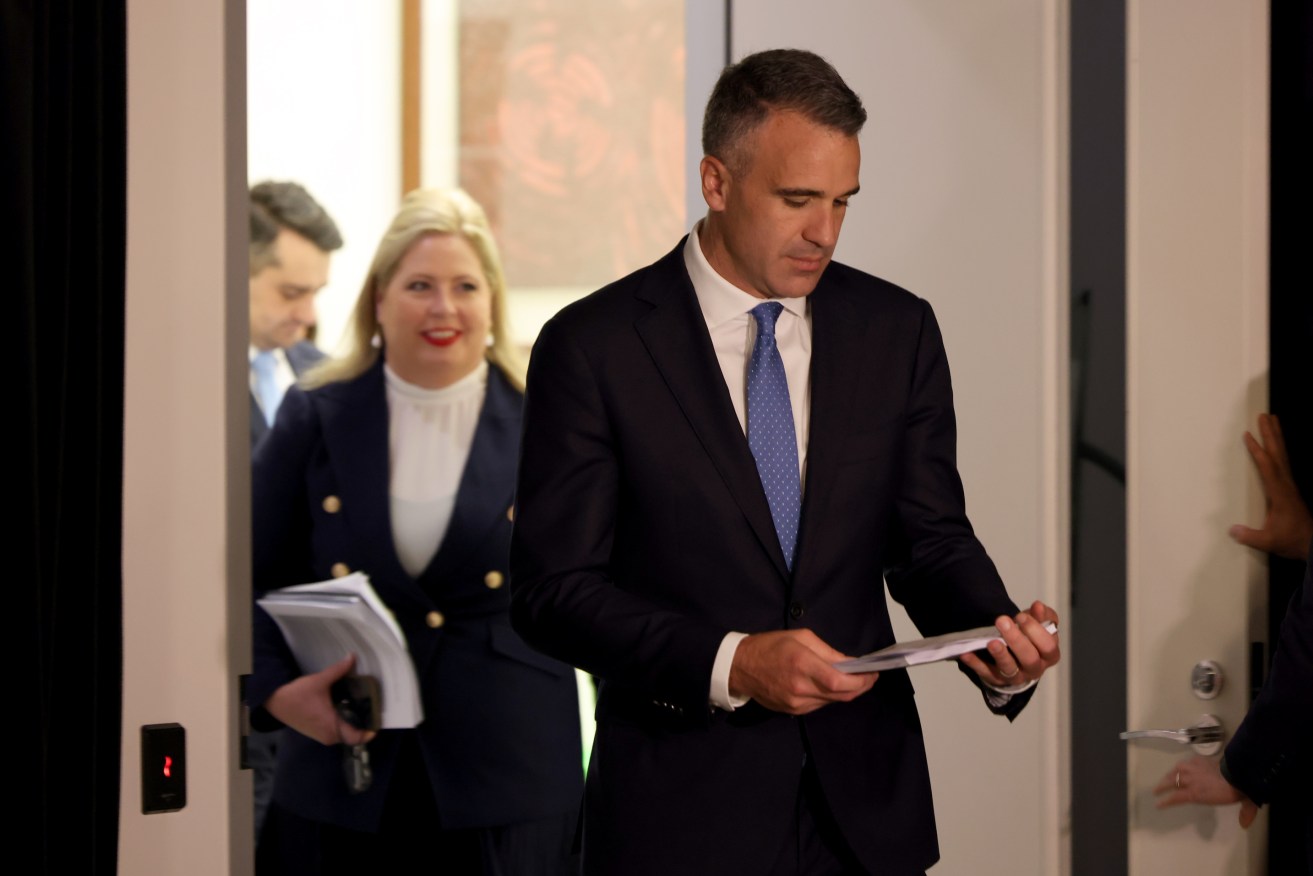‘Substantial undertaking’: Welfare checks begin on at-risk kids
Welfare checks on about 500 South Australian children who have been identified as living in “extremely vulnerable” situations are now underway, despite union concerns the work will add more pressure to a system already at “breaking point”.

Child Protection Minister Katrine Hildyard and Premier Peter Malinauskas. Photo: Tony Lewis/InDaily
Child protection workers this morning started visiting approximately 500 children living in 400 houses to check for signs of child neglect.
Premier Peter Malinauskas described the work as “substantial”, with the bulk of the checks to be carried out by workers from the Departments for Child Protection and Human Services under the oversight of SA Police.
“There are some instances where there are siblings involved, so that’s a very substantial undertaking,” he told parliament yesterday.
“That process is sought to be done as expeditiously as possible.”
Malinauskas last week ordered Police Commissioner Grant Stevens to coordinate the welfare checks following the release of a review into the deaths of six-year-old Munno Para girl Charlie and seven-year-old Craigmore boy Makai.
That review, conducted by former Police Commissioner Mal Hyde, found approximately 500 other children “may be in an extremely vulnerable situation”, similar to the circumstances in which Charlie and Makai lived prior to their deaths.
A separate report by child protection expert Kate Alexander, also released last week, found the child protection system was currently “stretched to breaking point”.
The Public Service Association, which represents child protection workers, told InDaily it was concerned that the welfare visits might take workers away from supporting other vulnerable at-risk children and families.
The union’s general secretary Natasha Brown said workers needed to be consulted to ensure the visits are carried out safely.
“The workload of [Department for Child Protection] staff needs to be managed to ensure that there are not further unreasonable demands placed on a system that has already been identified in the Alexander Report as being under ‘immense pressure’,” she said.
“Our members have not been consulted by the Department for Child Protection on how these visits will be conducted safely, and how it will be managing the impacts on their usual work protecting vulnerable children.
“Our members must be appropriately resourced and protected from unsafe situations as this situation evolves.”
Child Protection Minister Katrine Hildyard told InDaily the government was “mobilising” resources across the Department for Child Protection and other government agencies to conduct the checks.
She said the checks were now underway, with “highest priority” children being engaged first.
The Minister did not say when the government intended to complete the welfare checks.
Malinauskas yesterday acknowledged that the Departments for Child Protection and Human Services had “existing functions” that they carried out on a daily basis, but the government should “recognise the importance” of conducting the additional welfare checks.
He said even though some of the 500 children were already known to government departments, there was “no harm in double and triple-checking when we get the opportunity to do so”.
“It needs to be done thoughtfully and methodically,” he said.
“However, the exercise is being done as quickly as possible.”
It comes after Hildyard this morning announced that she had asked the Department for Child Protection to immediately recruit 42 additional social workers and 10 extra principal Aboriginal consultants.
She said those staff would be recruited from the $128.9 million allocated to the child protection portfolio in the June state budget.
“The Malinauskas Government is committed to appropriately resourcing our child protection system, so that vulnerable children and young people receive additional levels of support and security,” she said.
“It is extremely important that we listen to these reviews, and act swiftly and decisively to respond to the recommendations provided by Mal Hyde and Kate Alexander.
“We are determined to continue to work toward lasting improvements to the child protection system.”
Alexander’s review into the state government’s progress implementing child protection recommendations found a “recent spate of media reporting” had impacted workforce morale.
The review found anxiety amongst social workers was high and there was a risk that it could “derail sound decision-making and professional practice”.
“When social workers feel anxiety and pressure to predict and prevent deaths ‘at all costs’, their only option is to remove children, which addresses one risk while introducing a whole new one,” Alexander wrote.
“The evidence base about the impacts of growing up in care is well established.
“Not to mention the fact that the care system is stretched to breaking point, residential service are rarely the answer and carers feel overworked and undervalued.”




